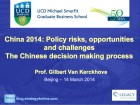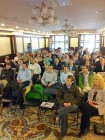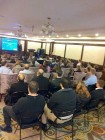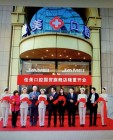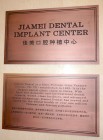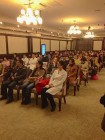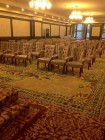On 26 February I joined the event where I also delivered a speech.
This event, jointly hosted by the European Union Chamber of Commerce in China and the Beijing City Government and organized by the Beijing Investment Promotion Bureau gave the foreign community in Beijing the opportunity to have direct talks with the Beijing municipal government and the investment authority on how to improve Beijing’s living and business environment and to hear about the future plans for the capital.
Location was Beijing International Hotel Convention Center, right on one of the most polluted days in Beijing (AQI over 500!). A lot was discussed about the air pollution and what Beijing was doing to improve the situation. About 65 people attended
And I was most probably the only one to go there on my bike, using my huge 3M mask. During the seminar it rained, maybe on order of the vice-mayor, and pollution levels fell to well below AQI 100.
(Pictures with me: thanks to the Chamber!)
The following Municipal Government delegates also attended:
- Beijing Municipal Commission of Development and Reform
- Beijing Municipal Commission of Science and Technology
- Beijing Municipal Commission of Economy and Information Technology
- Beijing Municipal Human Resources and Social Security Bureau
- Beijing Municipal Environmental Protection Bureau
- Beijing Municipal Commission of Transport
- Beijing Municipal Commission of Commerce
- Beijing Local Taxation Bureau
- Beijing Administration for Industry and Commerce
- Beijing Intellectual Property
- Beijing Municipal Office, SAT (China State Administration of Taxation)
- Beijing Investment Promotion Bureau
- Beijing Customs District People’s Republic of China
- Beijing Foreign Exchange Administration Office of State Administration of Foreign Exchange
- Exit-Entry Management Division of Beijing Municipal Public Security Bureau
Agenda:
– Welcome Speech by Adam Dunnett, Secretary General, European Chamber
– Speech by Beijing Environmental Protection Bureau
– Speeches by European Companies
- Mats Harborn, Vice President, European Chamber
- Gilbert Van Kerckhove, Chair of Public Procurement Working Group, European Chamber
- Mulan Zhao, Vice Chair of Human Resource Working Group, European Chamber
- Cyrus Ma, Quality & Safety Service Working Group, European Chamber
Speech by Ms Cheng Hong, Vice Mayor of Beijing City
Closing Speech and offering the Position paper to Vice Mayor by Mr Davide Cucino, President, European Chamber
My speech was, well, Gilbert’s style. Even the Vice Mayor thanked me personally. As many people liked it, I here give the full text.
Speech by Gilbert Van Kerckhove
Chair of the Public Procurement Working Group, EUCCC
Respected Madam Vice Mayor, respected leaders of the Beijing Municipality, Ladies and Gentlemen,
First of all we value this opportunity to meet with the leaders of the Beijing Government.
I would also like to express our thanks for the cooperation between the Municipality and our Public Procurement Working Group, in particular for the Exclusive Dialogue with the Beijing Development and Reform Commission on 7 November 2013.
I would like to say a few words about the air pollution in Beijing, a problem that is affecting our companies. Some expatriates either are leaving Beijing or refuse to come and work here because of the health threats. We are aware the Beijing government is trying its best to improve the air quality, as was detailed a few minutes ago by Ms. Li Xiaohua from the Beijing Environmental Protection Bureau.
On 2 July 2010 I had a meeting with Mayor Guo Jinlong and other leaders from the Beijing Government. I was appointed as “Committee Member of the Specialist Working Group for the Beijing 12th Five Year Plan”.
At the occasion I delivered a report on how to improve Beijing to become a better city. It is entitled “Problems of Traffic Congestion and Air Pollution”. It was published by the Beijing Foreign Affairs Office and was widely circulated among Chinese leaders.
Today I give a brief update on the report without trying to address the many other factors affecting traffic and pollution, such as producing more green electricity and cleaning up the polluting industries.
Most specialists agree that car exhausts account for about 25% of the Beijing pollution.
The pollution is aggravated by bad traffic conditions and heavy congestion. Cars get stuck in traffic, producing more exhaust gases. Bicycling, one green way to commute, is facing its own problems.
China has a big plan for electric vehicles. Right now, sales are well below expectations and one may wonder if the target can be met. In 2013, out of 18 million passenger cars sold, only 17,642 were alternative energy vehicles.
The national target for 2015 is to reach an annual production and sales of 500,000 energy-efficient and alternative-fuel vehicles, and 5 million green vehicles by 2020 including the annual production of 2 million pure electric cars and plug-in hybrids.
Beijing plans 200,000 clean energy vehicles by 2017.
My suggestion to let those cars drive every day was not followed.
Beijing does give special treatment for e-vehicles. In 2014 the city has 20,000 license plates available for electric, hybrid and solar-powered cars in a separate lottery, with half of those for individual buyers. In the first two months of 2014, 1,666 plates were available for 1,700 individual buyers. The quota will be increased in the next years.
Subsidies are still in place for buyers but Beijing still has to release the list of approved models; it is said all would be Chinese brands (*). The list to give subsidies to the buyers is too restrictive, foreign suppliers have basically no access to the subsidies. It does not allow the development of an advanced and competitive e-vehicle industry in the Chinese market. So, you can soon buy a TESLA electric car for RMB 734,000 but without subsidies.
Till now the plans for charging stations have seen little progress. For the people residing in apartments the stations are just a dream unlikely to materialize soon. At the end of 2013 Beijing had around 70 charging stations but most are for buses, taxis and other public vehicles. Beijing plans to install 1,000 charging stalls in 2014, with the target of having always a station within 5 Km. I hope it will become reality.
Citizens will only be really attracted to the new energy cars if they can drive every day, receive proper subsidies, have a wider choice and have easier access to charging stations.
Parking for bicycles has seen a positive development but still more needs to be done. The white iron parking rings are of inferior quality and many start to break down. No maintenance is seen. Many locations still need those.
Parking for bicycles in major buildings and hotels is still pretty poor, including here in the Beijing International Hotel.
Biking lanes have been improved with some new and separate lanes but again here maintenance is non-existent and separation barriers are often broken down or were simply removed by car drivers.
The expansion of bikes for hire has made a lot of progress. Unfortunately, bike lanes are still occupied by cars, pedestrians or other obstacles. Police does not do anything and many people are afraid to switch to bikes because of the dangerous conditions.
Another issue is a cultural one. Chinese friends are shocked I use a bike to go to meetings or to five-star hotels. They consider it a loss of face. On the other hand we have seen several foreign ambassadors and even a visiting Danish minister using bikes in Beijing.
I even joked that if President Xi Jinping goes to eat in a modest local eatery, why is the Beijing Mayor not going around once on a bike to show the example and to find out the difficulties. Mayors in Western countries have done exactly that.
Little has been done for the education of the traffic police and the general public, on road rules and good behavior. Traffic police presence and law enforcement are still poor. As was pointed out by other foreign traffic specialists, the police force could be easily expanded and paid for by collecting more fines for illegal parking, as well as for the improper use of roads, bike lanes and sidewalks.
I can give a long list of streets in Beijing where bike lanes are fully used by parked vehicles, with total impunity. Not only does it make biking dangerous, it also obstructs the traffic flow, leading to increased congestion.
Also, everyday I see huge traffic jams with cars blocking each other. Where is the traffic police to put order in the chaos?
Only if we free the streets, bike lanes and sidewalks from illegally parked cars can we promote the use of bicycles and walking, make the traffic flow smoother and convince drivers to leave their cars behind.
Of course, more attention needs to be paid to car parking spaces at office and residential buildings. Many of the parkings have been converted for other purposes.
Pollution is a serious issue but we all need to contribute to make Beijing a pleasant and green metropolis. People like myself call Beijing home. This is why, Madam Vice Mayor, I came today by bike and I am proud of it, not feeling “diu mianzi”, “losing face”.
Thank you for your attention!
(*) The same day the city announced a list of approved models, including BYD model E6
